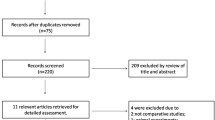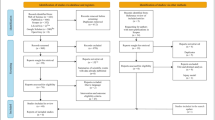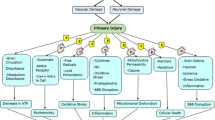Abstract
Progesterone, a steroid hormone, has been shown to have multifactorial neuroprotective effects in a variety of animal models of acute traumatic brain injury (TBI). Translation to humans showed positive effects in previous phase II trials, but unfortunately, negative results were observed in two recent phase III trials. The present study focuses on the efficacy of progesterone on acute TBI based on the published data of randomized controlled trials (RCTs). MEDLINE, EMBASE, and Cochrane Library were used to search from January 1980 to August 2015 for English language studies. The primary outcome was a favorable outcome in the Glasgow outcome scale (GOS). The secondary outcomes included mortality and adverse events. A total of 2396 patients from 5 RCTs were included in the present study. There were no significant differences in favorable outcome (relative risk (RR) 1.07, 95 % confidence interval (CI) 0.91 to 1.27, P = 0.41) and mortality rate (RR 0.85, 95 % CI 0.65 to 1.13, P = 0.27) between progesterone and placebo groups. In a subgroup analysis, favorable outcome (RR 1.45, 95 % CI 1.11 to 1.89, P = 0.007) and decreased mortality rate (RR 0.58, 95 % CI 0.41 to 0.84, P = 0.004) are only observed in the phase II RCTs. The included factors were the severity of TBI, method of drug administration, and duration of observation and had no influence on the observed outcomes. Sensitivity analysis showed that all the outcomes were stable after excluding Shakeri (Clin Neurol Neurosurg 115: 2019-2022, 2013) or Wright (N Engl J Med 371: 2457-2466, 2014) trials. The quality of the evidence was varied from high to low. In conclusion, progesterone has no significant improvement in the functional recovery and mortality rate after acute TBI.



Similar content being viewed by others
References
Langlois JA, Rutland-Brown W, Wald MM (2006) The epidemiology and impact of traumatic brain injury: a brief overview. J Head Trauma Rehabil 21(5):375–378
Roozenbeek B, Maas AI, Menon DK (2013) Changing patterns in the epidemiology of traumatic brain injury. Nat Rev Neurol 9(4):231–236. doi:10.1038/nrneurol.2013.22
Radosevich JJ, Patanwala AE, Erstad BL (2013) Emerging pharmacological agents to improve survival from traumatic brain injury. Brain Inj 27(13–14):1492–1499. doi:10.3109/02699052.2013.823658
Margulies S, Hicks R, Combination Therapies for Traumatic Brain Injury Workshop L (2009) Combination therapies for traumatic brain injury: prospective considerations. J Neurotrauma 26(6):925–939. doi:10.1089/neu.2008-0794
Zygun DA, Kortbeek JB, Fick GH, Laupland KB, Doig CJ (2005) Non-neurologic organ dysfunction in severe traumatic brain injury. Crit Care Med 33(3):654–660. doi:10.1097/01.ccm.0000155911.01844.54
Deutsch ER, Espinoza TR, Atif F, Woodall E, Kaylor J, Wright DW (2013) Progesterone’s role in neuroprotection, a review of the evidence. Brain Res 1530:82–105. doi:10.1016/j.brainres.2013.07.014
Pettus EH, Wright DW, Stein DG, Hoffman SW (2005) Progesterone treatment inhibits the inflammatory agents that accompany traumatic brain injury. Brain Res 1049(1):112–119. doi:10.1016/j.brainres.2005.05.004
He J, Evans CO, Hoffman SW, Oyesiku NM, Stein DG (2004) Progesterone and allopregnanolone reduce inflammatory cytokines after traumatic brain injury. Exp Neurol 189(2):404–412. doi:10.1016/j.expneurol.2004.06.008
Roof RL, Duvdevani R, Stein DG (1993) Gender influences outcome of brain injury: progesterone plays a protective role. Brain Res 607(1–2):333–336. doi:10.1016/0006-8993(93)91526-X
Roof RL, Hoffman SW, Stein DG (1997) Progesterone protects against lipid peroxidation following traumatic brain injury in rats. Mol Chem Neuropathol 31(1):1–11. doi:10.1007/BF02815156
Wright DW, Bauer ME, Hoffman SW, Stein DG (2001) Serum progesterone levels correlate with decreased cerebral edema after traumatic brain injury in male rats. J Neurotrauma 18(9):901–909. doi:10.1089/089771501750451820
Ducharme N, Banks WA, Morley JE, Robinson SM, Niehoff ML, Mattern C, Farr SA (2010) Brain distribution and behavioral effects of progesterone and pregnenolone after intranasal or intravenous administration. Eur J Pharmacol 641(2–3):128–134. doi:10.1016/j.ejphar.2010.05.033
Wright DW, Kellermann AL, Hertzberg VS, Clark PL, Frankel M, Goldstein FC, Salomone JP, Dent LL et al (2007) ProTECT: a randomized clinical trial of progesterone for acute traumatic brain injury. Ann Emerg Med 49(4):391–402. doi:10.1016/j.annemergmed.2006.07.932, 402 e391-392
Xiao G, Wei J, Yan W, Wang W, Lu Z (2008) Improved outcomes from the administration of progesterone for patients with acute severe traumatic brain injury: a randomized controlled trial. Crit Care 12(2):R61. doi:10.1186/cc6887
Shakeri M, Boustani MR, Pak N, Panahi F, Salehpour F, Lotfinia I, Meshkini A, Daghighi S et al (2013) Effect of progesterone administration on prognosis of patients with diffuse axonal injury due to severe head trauma. Clin Neurol Neurosurg 115(10):2019–2022. doi:10.1016/j.clineuro.2013.06.013
Wright DW, Yeatts SD, Silbergleit R, Palesch YY, Hertzberg VS, Frankel M, Goldstein FC, Caveney AF et al (2014) Very early administration of progesterone for acute traumatic brain injury. N Engl J Med 371(26):2457–2466. doi:10.1056/NEJMoa1404304
Skolnick BE, Maas AI, Narayan RK, van der Hoop RG, MacAllister T, Ward JD, Nelson NR, Stocchetti N et al (2014) A clinical trial of progesterone for severe traumatic brain injury. N Engl J Med 371(26):2467–2476. doi:10.1056/NEJMoa1411090
Stein DG (2015) Embracing failure: what the phase III progesterone studies can teach about TBI clinical trials. Brain Inj 1–14
Liberati A, Altman DG, Tetzlaff J, Mulrow C, Gotzsche PC, Ioannidis JP, Clarke M, Devereaux PJ et al (2009) The PRISMA statement for reporting systematic reviews and meta-analyses of studies that evaluate healthcare interventions: explanation and elaboration. BMJ 339:b2700. doi:10.1136/bmj.b2700
Shi L, Pu J, Xu L, Malaguit J, Zhang J, Chen S (2014) The efficacy and safety of cilostazol for the secondary prevention of ischemic stroke in acute and chronic phases in Asian population—an updated meta-analysis. BMC Neurol 14(1):251. doi:10.1186/s12883-014-0251-7
Baulieu EE, Robel P, Schumacher M (2001) Neurosteroids: beginning of the story. Int Rev Neurobiol 46:1–32
Maas AI, Stocchetti N, Bullock R (2008) Moderate and severe traumatic brain injury in adults. Lancet Neurol 7(8):728–741. doi:10.1016/S1474-4422(08)70164-9
Xydakis MS, Ling GS, Ecklund JM (2015) Progesterone in traumatic brain injury. N Engl J Med 372(18):1765. doi:10.1056/NEJMc1503138#SA1
Khanna A, Simard JM, Kahle KT (2015) Progesterone in traumatic brain injury. N Engl J Med 372(18):1765–1766. doi:10.1056/NEJMc1503138#SA2
Xydakis MS, Ling GS, Mulligan LP, Olsen CH, Dorlac WC (2012) Epidemiologic aspects of traumatic brain injury in acute combat casualties at a major military medical center: a cohort study. Ann Neurol 72(5):673–681. doi:10.1002/ana.23757
Manley GT, Maas AI (2013) Traumatic brain injury: an international knowledge-based approach. JAMA 310(5):473–474. doi:10.1001/jama.2013.169158
Acknowledgments
This study was supported by the National Natural Science Foundation of Zhejiang Province (Y15H090022) to Jun Yu and Health Department Foundation of Zhejiang Province (2013KYA097) to Zhen Wang.
Authors’ Contributions
J. M. Zhang is the principal investigator. J. Yu designed the study and developed the analysis plan. Z Wang and L. G. Shi analyzed the data and performed meta-analysis. L. G. Shi contributed in writing of the article. W. Ding and FJ Shao revised the manuscript and polished the language.
Author information
Authors and Affiliations
Corresponding author
Ethics declarations
Conflict of Interest
The authors declare that they have no competing interests.
Additional information
Zhen Wang and LiGen Shi contributed equally to this work.
Rights and permissions
About this article
Cite this article
Wang, Z., Shi, L., Ding, W. et al. Efficacy of Progesterone for Acute Traumatic Brain Injury: a Meta-analysis of Randomized Controlled Trials. Mol Neurobiol 53, 7070–7077 (2016). https://doi.org/10.1007/s12035-015-9614-3
Received:
Accepted:
Published:
Issue Date:
DOI: https://doi.org/10.1007/s12035-015-9614-3




